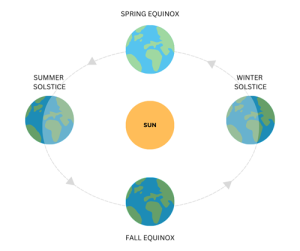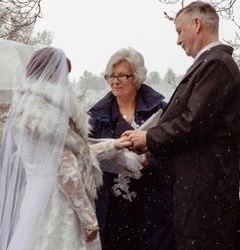The Persistent Pulse of Ceremony: Human Needs for Ritual in an Age of Secularisation
by Dr. Lorne F. Brock, 2025
Introduction
Throughout history, people have participated in rituals, ceremonies, and forms of worship to mark significant moments in life, deal with their fears about existence, and strengthen community ties. However, as sociologist Max Weber pointed out, modern society’s focus on logic and science has weakened traditional religious practices. This shift has left many searching for new ways to find meaning in life, face the idea of death, and connect with something greater than themselves. (3,10)
 Today, many young people, particularly from Generation Z, identify as religiously unaffiliated, with some even considering themselves atheists. Despite this decline in traditional religious beliefs, the desire for purpose, community, and comfort in the face of life’s challenges remains strong. (3,11) This paper suggests that personalised spiritual practices and non-religious ceremonies are becoming popular alternatives to traditional rituals. These new forms are adapting to our modern world while still addressing the fundamental human needs related to understanding life and death, feeling like we belong, and experiencing a sense of connection beyond ourselves.
Today, many young people, particularly from Generation Z, identify as religiously unaffiliated, with some even considering themselves atheists. Despite this decline in traditional religious beliefs, the desire for purpose, community, and comfort in the face of life’s challenges remains strong. (3,11) This paper suggests that personalised spiritual practices and non-religious ceremonies are becoming popular alternatives to traditional rituals. These new forms are adapting to our modern world while still addressing the fundamental human needs related to understanding life and death, feeling like we belong, and experiencing a sense of connection beyond ourselves.
The Existential Void: Disenchantment and Its Consequences
Weber’s exploration of modern societies shows how many people today face a crisis of “meaninglessness.” In an age where science and reason dominate, we often struggle with deep questions about death and what gives life purpose (2). In the past, traditional religions offered comforting stories, framing death as a natural part of a larger divine plan, like the Christian belief in resurrection or the Eastern idea of reincarnation. Without these guiding beliefs, death can feel like a jarring experience rather than a meaningful change (6,10).
Today, this discomfort with mortality often manifests in our culture through frightening images and stories, such as zombies and vampires. These creatures represent a sense of death that never finds peace or meaning (10).
Many of us have a fear of death, and this fear can make us feel even more unsure and worried about our lives. It can create a cycle of anxiety that grows stronger, leading to feelings of unease about everyday life. This is often made worse by:
1. Medical Focus on Death: Nowadays, many people die in hospitals or other medical settings, often without the comfort of family or cultural practices that used to surround death (2,6).
2. Decline of Shared Grieving Practices: Traditional rituals like religious funerals that used to bring people together to share their grief are becoming less common. As a result, many individuals face the loss of loved ones, feeling alone (6,13).
3. Lack of Purpose or Closure: In our modern world, we often hear about constant progress and improvement, but this can leave people feeling like there’s no clear endpoint or sense of closure when it comes to life and death (2).

Secular Rituals as Replacements:
Frameworks and Examples
Secular ceremonies provide a meaningful alternative by focusing on essential aspects of life, like our connections with each other, our relationship with nature, and the memories we leave behind. They address four crucial human needs that religion often fulfils: finding meaning, having a sense of purpose, feeling part of a community, and participating in rituals (3,13). Unlike strict religious traditions, these ceremonies are more flexible and can be customised to reflect individual beliefs and values better.
1. Lifecycle Ceremonies:
Weddings: In non-religious ceremonies, the focus is on the couple’s commitment to each other rather than a blessing from a higher power. Instead of traditional phrases that mention God, these ceremonies use heartfelt promises based on love, loyalty, and shared values. To symbolise the partnership, couples might include unique rituals like planting a unity tree, a sand ceremony, or writing their vows. They may also choose readings from secular books, like those by Victor Hugo, to emphasise humanist principles and the importance of love and connection (4,8).
Birth/Coming-of-Age: “Naming ceremonies” are joyful events that celebrate a new baby’s arrival. They often include poetry and promises from parents and the community to support the child. As children enter their teenage years, they participate in special activities called “rites of passage.” These might include wilderness retreats or mentorship programs, which help them face challenges and reflect on their journey into adulthood (13).
2. Mortality and Memorialisation:
Funerals: Non-religious services aim to celebrate the unique qualities of the person who has passed away. These ceremonies can include activities like creating memory books, sharing stories about the individual, planting trees in their honour, or playing their favourite songs. Celebrants who focus more on humanist values lead these services, highlighting the person’s legacy and the impact they made, rather than discussing life after death (6,13).
Staying Connected: Rituals like holding yearly memorials, making art from ashes, or dedicating community projects help people maintain their bonds with loved ones even after they’ve passed away (6).

3. Communal and Seasonal Practices:
Celebrating the Solstices: Gathering to celebrate the changing of the seasons, such as during the summer or winter solstice, can include activities like sharing meals, having bonfires, or taking walks in nature. These activities help people connect with the natural world without involving any religious or supernatural elements (13).
Time for Reflection: Setting aside regular time for self-reflection, taking a break from technology (digital detox), or spending quality time with family can serve as an alternative to traditional religious practices. This can involve practising mindfulness or enjoying meals together (13,14).
4. Transcendence Practices:
Finding Wonder in Nature and the Universe: Activities like stargazing, walking through forests, or visiting amazing natural sites can inspire a sense of awe. By learning about the science behind these experiences, such as the famous idea from Carl Sagan about how small our planet is in the vast universe, we can feel a deeper connection to it all (2,14).
Coming Together as a Community: Getting involved in volunteer work, joining activism efforts, or participating in community gardening can create a sense of “horizontal transcendence.” This means feeling connected to something bigger than ourselves by sharing experiences with others and engaging in our communities (14).

Cultural Contexts Shaping Personalised Spirituality
The way we create our own spiritual practices is significantly shaped by the cultures in which we live. This means that the rituals we choose often reflect the unique beliefs and traditions of our backgrounds, leading to different ways people express their spirituality.
1. Western Individualism: In countries like Canada, the U.S., and throughout Europe, many people are creating their own beliefs by mixing different spiritual practices. This often includes elements from wellness activities like yoga and meditation, along with social issues like justice and environmental concerns, all fueled by online communities. For instance, research shows that nearly 30% of Christians in North America believe in reincarnation, while more than a third think objects can have “spiritual energy.” This trend reflects a shift toward emphasising personal choice and a questioning of traditional institutions (3,11).
2. Eastern and Indigenous Syncretism: In cultures with deep-rooted traditions, such as Japan, which blends Shinto and Buddhist practices, the focus is on adapting rituals rather than completely abandoning them. Many often engage in secular practices that honour ancestors, promote harmony with nature, and encourage mindfulness, all without requiring specific religious beliefs (11).
3. Digital Nativism: Younger generations, including Millennials and Gen Z, are utilising digital platforms like Reddit, mindfulness apps, and Instagram to explore spirituality. This makes practices such as tarot reading and meditation more accessible, often distancing them from their traditional roots (3,11).
4. Post-Colonial Contexts: In areas where colonial powers imposed their religions, many individuals are reclaiming their cultural heritage through modern rituals. For instance, the Day of the Dead celebration in Mexico combines honouring ancestors with secular traditions, creating a unique blend of remembrance and cultural pride (13).
Addressing Existential Questions: Mortality and Transcendence
Secular ceremonies reframe life’s biggest questions without invoking the supernatural:
1. Mortality: Thinkers like Albert Camus and Viktor Frankl encourage us to find meaning in our ability to bounce back from tough times. Instead of seeing death as something to fear, they suggest we view it as a natural part of life that gives us a sense of urgency to truly live. Secular funerals focus on the idea of leaving a legacy—what we call “symbolic immortality”—which means being remembered through our memories, the impact we have on others, or the creative work we leave behind (2,6). As Bob Lynn points out, grieving without a religious context can be a way to fully accept and honour our reality by acknowledging that life is finite (6).
2. Transcendence: Traditional ways of seeking a connection with the divine are changing. Instead of focusing solely on a vertical relationship with God, people are now exploring “horizontal” connections that emphasise relationships and community. Here are a few key ways this transformation is happening:
• Connecting with Others: Acts of kindness and support for each other give us a sense of purpose that goes beyond our individual lives (14).
• Connecting with Time: Understanding our place in the larger story of humanity helps us feel a sense of wonder and appreciation for life, similar to what scientist Carl Sagan called the “cosmic perspective.” (2)
• Connecting with Nature: Participating in ecological activities, like planting trees in memory of loved ones, helps us feel part of the greater cycles of life that go on beyond ourselves (13,14).
These new avenues for connection encourage us to build relationships and find meaning in both our interactions with each other and the planet.
3. Community and Continuity: While churches offer a sense of community through their structures and gatherings, other groups outside of religion build connections based on common interests. For example, humanist groups or places where people talk about topics like death can help people feel like they belong. Activities like group gardening or participating in social causes create what writer Alain de Botton calls “secular congregations,” which are gatherings focused on shared values and experiences rather than religious beliefs (14).
Challenges and Limitations
Even though secular ceremonies (non-religious rituals) can adapt to different beliefs, they still have some challenges:
• Lack of Unity: When people create their spiritual practices, it can lead to a variety of ideas that do not connect well, making it hard to find familiar stories or experiences. (7,14)
• Missing Depth: Some critics believe that when people design their rituals, these can lack the historical significance and profound emotional impact that traditional religious ceremonies often have. (7)
• Commercialisation: The wellness industry has turned many rituals into paid experiences (like expensive meditation retreats), which can leave out people from less privileged backgrounds. (3,11)
Conclusion
As traditional organised religion becomes less common, many people are exploring new ways to celebrate important life events. These modern ceremonies are not just simple substitutes for religious rituals; they offer fresh, meaningful ways to connect with what matters in life. They help us face serious topics like our own mortality, seek more profound meaning in our lives, and build stronger communities. Often, they pull inspiration from nature, our personal stories, and the bonds we share.
Culturally, these new ceremonies demonstrate a trend of blending different traditions to create unique forms of spirituality. They may combine aspects of Western ideas about personal growth with practices from Indigenous cultures that emphasise our connection to the natural world. This blend highlights how our human experiences can relate to our environment in profound ways.
Even though these new rituals can face challenges, like sometimes lacking a clear structure or varying in depth, they reveal a basic human need to find meaning in life. Sociologist Max Weber pointed out that when traditional beliefs start to fade, people don’t stop searching for purpose; they begin looking for it in different places, right in our communities and everyday lives.
In this way, secular ceremonies show us that sacred experiences don’t have to come from religious beliefs. Instead, they can arise from special celebrations that honour our humanity and acknowledge our shared existence. These rituals remind us that we can create meaningful moments and connections with one another without relying on conventional religious frameworks.
References
Burton, T. I. (2024). Strange Rites: New Religions for a Godless World. (Based on 3).
De Sapio, M. (2023). On the Spiritual and the Cultural Life. (Based on 7)
Frankl, V. (2006). Man’s Search for Meaning. Beacon Press. (Based on 2).
Heard, C. (2023). Creating Your Own Secular Rituals and Traditions (13).
Krattenmaker, T (2018). A New Vision for Secular Transcendence. (14)
Lynn, B. (2025). Embracing mortality: A secular perspective on death and life. Medium. https://bob-lynn.medium.com/embracing-mortality-a-secular-perspective-on-death-and-life-cbdec46e1aa6 (6.)
Mennell, E. (2024). Is Religion Relevant Today? A Shift Towards A Personalised Spirituality. (11)
Mintz, S (2024). How Secular Societies Make Peace with Death in a Godless World (2)
Death is not the End (10)
Sagan, S. (2019). For Small Creatures Such as We: Rituals for Finding Meaning in Our Unlikely World. G.P. Putnam’s Sons. (Based on 13).
Taylor, C. (1992). The Ethics of Authenticity. Harvard University Press. (Based on 14).
ULC. (2022). Non-religious wedding ceremony script. Universal Life Church. https://www.ulc.org/wedding-ceremony-scripts/non-religious-wedding-ceremony-script?srsltid=AfmBOop-6SR2Ygs94oAsh-JXqqefLJ3X-EHn7CwrAjJzWhe58J7CBR2d (4).
Weber, M. (1946). Science as a vocation. In H. H. Gerth & C. W. Mills (Eds.), From Max Weber: Essays in sociology (pp. 129–156). Oxford University Press. (Based on 2, 10).


